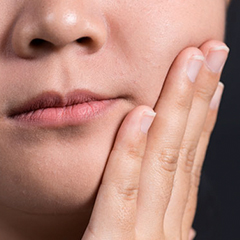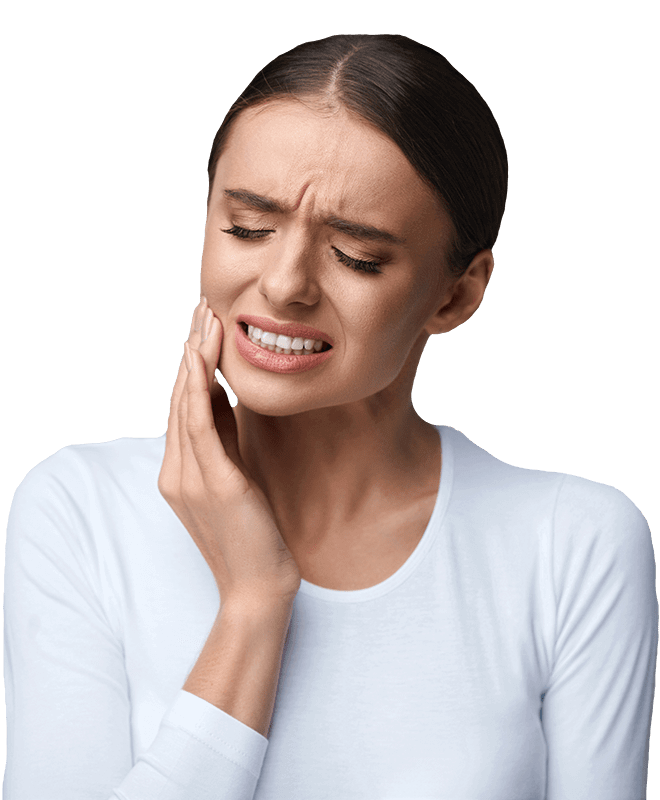
Jaw pain and soreness can have a number of different causes, including a traumatic injury to the face. Trauma can result in a variety of dental problems including a complex condition called Temporomandibular Joint Disorder (TMD). Many types of blunt trauma can result in damage to the upper or lower jaw or the temporomandibular joint (TMJ)—which is actually a set of paired joints, one on each side of the face, situated just in front of the ear canals.
Blows to the face from sports accidents, motor vehicle collisions, and falls are just a few of the things that can cause jaw injury; the pain that results may range from mild to severe. A damaged jaw may be actually broken (fractured), or it may be dislocated, meaning that it has shifted out of its proper position. This type of injury may also involve loosened or displaced teeth, a broken condyle (the ball-like piece at the head of the TMJ), and/or lacerations (cuts) and swelling.
Regardless of what caused the injury, jaw pain is often accompanied by muscle spasm in one or more of the large muscles on either side of the jaw. Following stress or injury, these muscles may lock up, essentially “freezing” the jaw in position in the body’s attempt to prevent further damage.
A jaw fracture is often suspected after serious facial injury. Symptoms of a broken jaw may include: facial bruising, swelling, or bleeding; stiffness of the jaw or difficulty opening or closing the mouth properly; pain or tenderness that gets worse when chewing; loosened teeth; and numbness of the face or lips. However, the only way to tell for sure if the jaw is broken is to have a thorough physical examination with diagnostic imaging (such as x-rays).
A person who may have a broken jaw should seek prompt medical evaluation and treatment. On the way to the emergency room or medical care provider, the jaw can be held in place with the hands to help reduce pain caused by movement; alternately, it can be bandaged with a cloth that wraps under the jaw and over the head. However, the bandage must allow the patient to breathe freely, and should be easily removable in case it is necessary to vomit. Ice or a cold pack should be applied to the outside of the injured area to help ease the pain and swelling.
Depending on the severity of the fracture, a broken jaw may be wired shut for a few weeks to aid healing, or it may be allowed to heal on its own. Surgery and dental work are sometimes needed to repair moderate or severe fractures. A diet of liquids (and possibly soft foods) will probably be recommended for a period of time. In addition, pain medication and antibiotics may be prescribed, especially if a tooth socket is fractured.
The symptoms of a dislocated jaw are similar to those of a broken jaw, but are sometimes less severe. They include: difficulty speaking and/or eating; inability to close the mouth properly; a bite that feels “crooked”, or teeth that don’t align properly; drooling or protrusion of the jaw; and pain in the affected area, which often gets worse when the jaw moves. However, as with a broken jaw, a prompt medical evaluation with x-rays is necessary to confirm the diagnosis.
First aid for a dislocated jaw is the same as for a fractured jaw. Treatment, however, may be different: It is sometimes possible for a medical professional to manually re-position the jaw; this may be done with the aid of anesthetic and muscle relaxing medications. When the jaw is put back in position, it may be stabilized with bandages or by other methods. Afterwards, the patient may need to avoid eating hard foods or opening the mouth wide for a period of several weeks.

Use emergency dental service to find emergency dentists near you that have the ability to care for all dental emergencies that may occur unexpectedly. Our patient support center is open to take emergency calls 24 hours a day 7 days each week and will connect you with multiple dentists that have walk-in appointment hours. To get started, call our 24/7 emergency dental service number: 1-888-350-1340, enter your zip code, and then wait to be connected with a dentist near you.
Emergency Weekend Dentist
Emergency Weekend Dentist
Emergency Weekend Dentist
Emergency Weekend Dentist
Emergency Weekend Dentist
Emergency Weekend Dentist
Emergency Weekend Dentist
Emergency Weekend Dentist
Emergency Weekend Dentist
Emergency Weekend Dentist